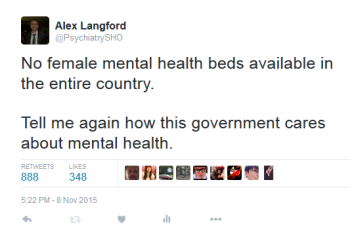No beds in the whole country – mental health services hit a new low
November 11, 2015 2 Comments
Two years ago, I posted a tweet that a lot of people found very worrying.
I hadn’t been working in mental health for long, and had been shocked to discover that often the local area, even if it was the capital city, would have no available inpatient beds. Patients would have to be sent out-of-area, often hundreds of miles away, to be admitted.
The Guardian asked me to write about it in more detail, which I did. We were hopeful that with all the publicity occurring at the time, things would change.
And since then, things have changed.
Now, they’re even worse.
I don’t usually talk online about my individual professional experiences. But recently, I found it hard to contain my frustration and sheer disappointment. Presented with a patient who needed a bed, there were none in the local area, none in the surrounding areas, and none in the private sector nationwide. Patients like this, wherever they present in the country, have no option but to wait in A+E, or at home, or in a police cell, until appropriate, safe care can be provided. Which is a disgrace.
Minister for Health Alistair Burt MP was quick to reply that my statement ‘was found to be untrue‘ – by which I think he meant that there were some beds available in the country, but probably in random Trusts, hundreds of miles away. Trusts have no practicable way of contacting every other Trust in the country to seek out the last open bed in the land, and even if they could, that Trust would likely be trying to protect it for their own patients. So not a particularly constructive response from the Minister (what would’ve been wrong with ‘tell me more about the problem?’).
I don’t want to dwell on the minutiae of my own particular situation. My patients and my Trust deserve their privacy as they fight their own respective battles. But it wasn’t an unusual situation for a UK mental health service. Norfolk and Suffolk have been the only Trust that I know of who’ve been brave enough to say it publicly, but not being able to find a bed in the whole country is the new baseline for ‘tricky weekend’ in mental health.
It’s not hard to see how we got here.
The government has tried bloody hard to convince us that funding in mental health is rising, but the numbers aren’t exactly shouting out that conclusion. Some sources say there could actually have been cuts of up to 8%, with Trusts forecasting the same cuts again over the next few years.
Even if you believe the government line, that there has been investment (which they don’t seem to be sure about themselves), it pales into insignificance as part of the bigger picture.
Mental health was drastically underfunded to start with, accruing just 13% of NHS funding, despite accounting for 23% of the ‘illness burden’. But now with austerity in full flow, way more people are in contact with mental health services than ever before. Our sister services, public health and social care, have been decimated, leaving us to pick up their slack.
The end result? Carnage. We’ve lost 17% of our beds in the last 3 years (5% in the last year alone). The amount we pay private hospitals to takes care of our patients, because our own beds are full, has doubled in the last year alone to a very conservative estimate of £38m. Out-of-area admissions rose 23% in the same period. Bed occupancy is 94% on average, with some Trusts working at over 100%. And we used the Mental Health Act 10% more this year than the previous year, as patients spiral into crisis and need to be compulsorily detained more often, into beds hundreds of miles away that they’re less likely to go to willingly.
The interim report of the Crisp Commission has shown us that we technically may have enough beds, it’s just that so many of them are taken up by people who could be discharged but have nowhere to go. Good health doesn’t happen due to health services alone, so to say you’ve ‘ring fenced’ the health budget while cutting social care funding is willful idiocy.
In a way, I wish the solution to this problem was more complicated than it really is. It would reassure me that our politicians are working hard to fix the problem, but haven’t been able to. But that’s not the case.
We need real funding. Not just for isolated interventions like perinatal, liaison or early intervention services that have robust cost-effectiveness evidence bases and slightly-flashier-than-average selling points, but for general services too. Not just for humane reasons, but to stop our patients burning through funds in other services (police, A+E, ambulances) without it doing anyone any good. Spending money on mental health saves money, and not funding us adequately creates an inefficient, shameful shambles.
We need not just well-meant documents like the Crisis Care Concordat, but to stop cutting nursing staff numbers (down 3,300 over the last 5 years) so there’s someone left to provide actual care.
And besides all that, we need to be incredibly wary of slick rhetoric from politicians about how mental health services are a key issue, without them giving detailed assurances – including significant funding amounts – that big changes are about to be made. Their talk is cheap, and increasingly so, your mental health treatment is too.




It’s not just beds we lack in this country. We are so behind in our services for people suffering with and needing mental health services in general. Very poor limited service with low priority 😤
nice article Langford!! We know its true…